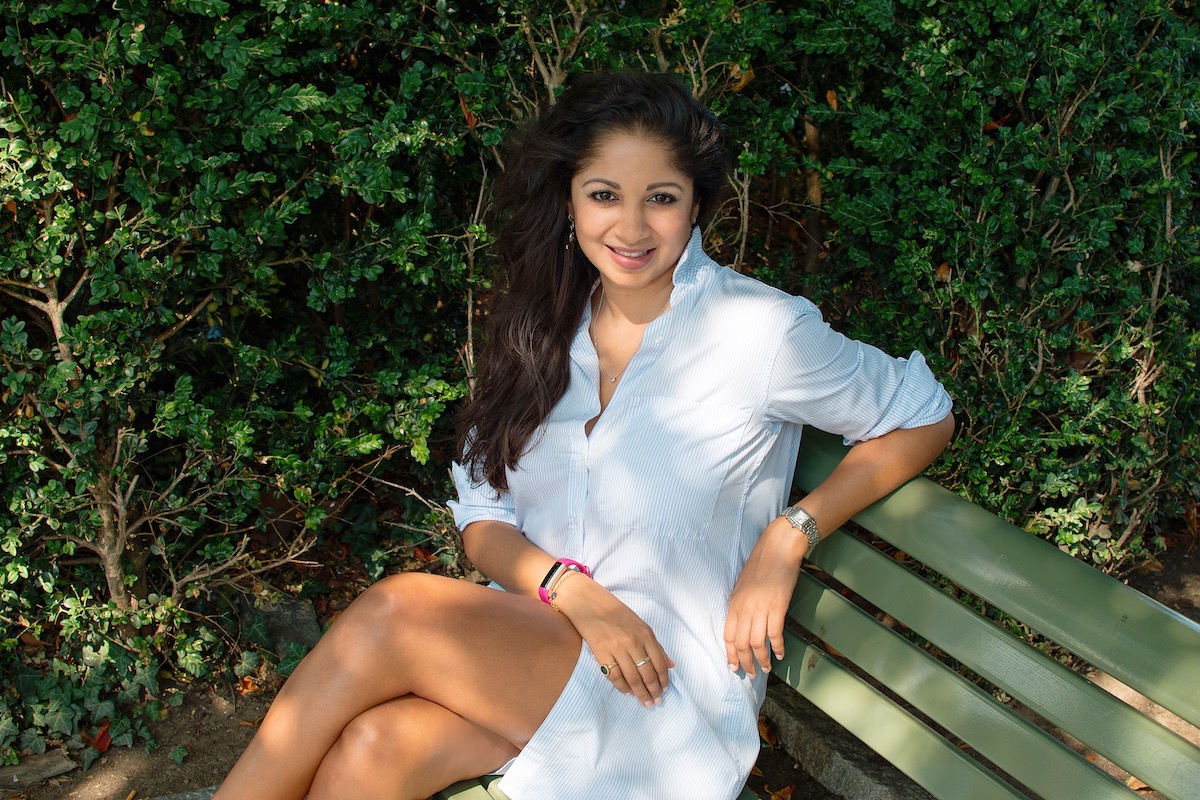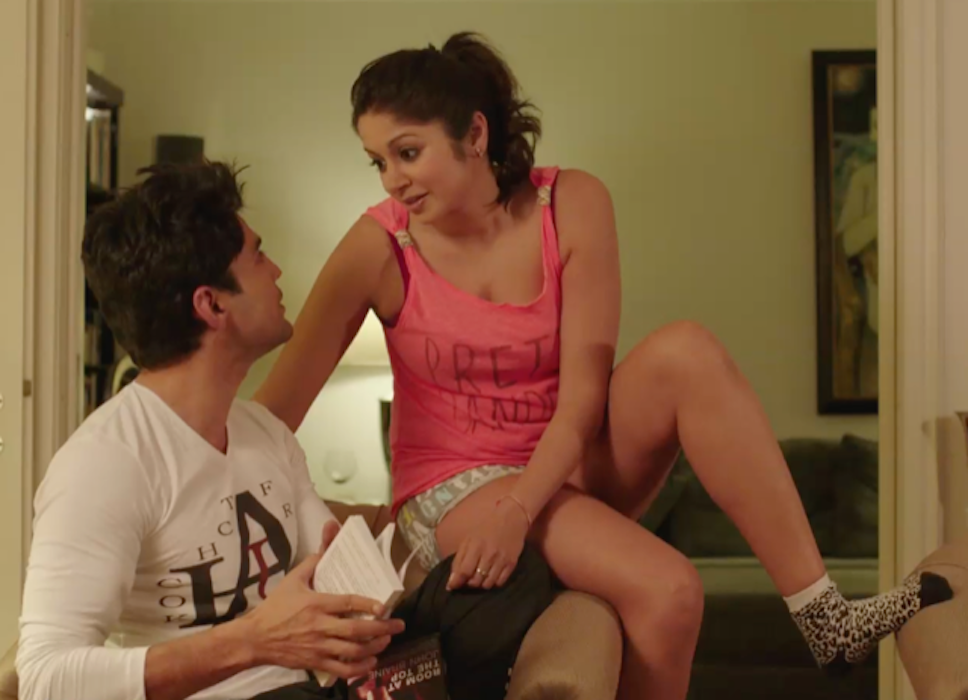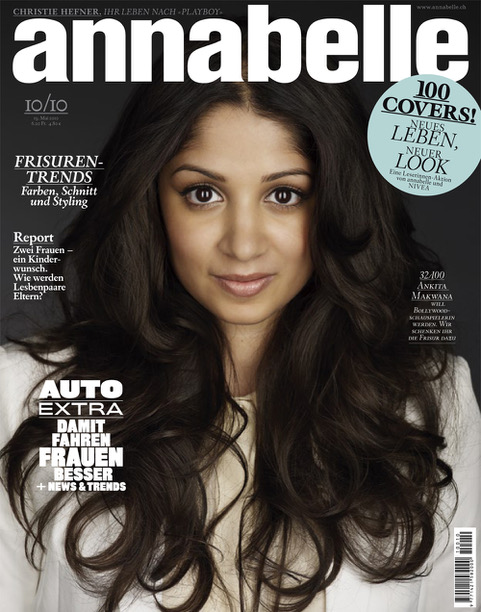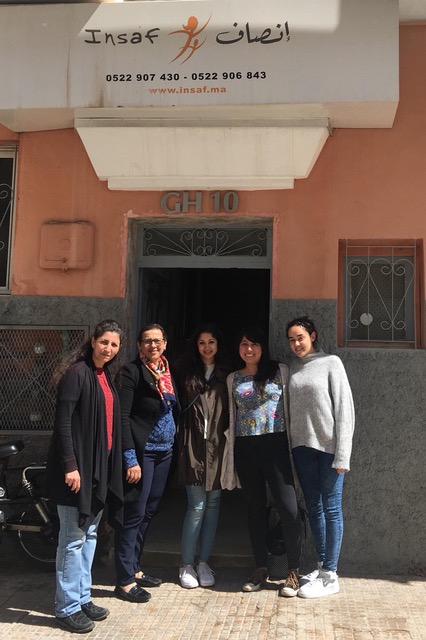
Actor Ankita Makwana Talks Bollywood and Believing in Your Dreams
September 26, 2018
Rana Good is the founder of Naïra NYC. A writer for publications such as Forbes, Travel + Leisure, Coveteur, Mens Journal and others, she created her own platform celebrating women of color.
While other children were playing outside during their summer holidays, Swiss-Indian actor Ankita Makwana was developing her on-camera career. Over the last 15 years she’s graced TV and film as a host, commercial actress and most importantly, Bollywood star. Her last movie Fever opened to a worldwide audience and put her on the map as a lead actress. A woman who’s seized every opportunity life has given her, Makwana is an advocate for pursuing your dreams which she recently discussed in a highly motivating TED talk. The actor also recently launched a charity to help underprivileged children and single mothers have access to education which she believes is the foundation of success in life. We caught up with her in Zurich to find out how she manages her various projects and how a little faith in yourself can go a long way.
You started acting, hosting, performing at a young age. Tell me about your childhood, how did you merge a career in show business and still go to school.
Ankita Makwana: I grew up in Switzerland and we have around 13 weeks holidays per year during which I always went to India or England to perform and act. My parents were very supportive so I could live my childhood dream but I still had to study and go to school of course. The first time I remember acting was in an Indian mythological play, I was maybe 8 or 9 years old. I remember it well because I was always looking forward to it because I had seen people perform and dance in Bollywood songs. I wanted to be just like the older girls performing and was very excited when my parents let me. I didn’t even have my ears pierced yet so I had to wear little clip-on earrings which I was also totally excited about as well. Then when I was a teenager a TV team from London came here looking for local co-hosts but then they wanted me to come back to UK and do my filming, schooling and everything there. That was when my parents put a hold on everything saying “you are not going to do that.”
Was it challenging to do both?
No, it was fun! I never thought about it as work — the moment you do you won’t like doing it as much but I never did. It was like living in two totally different worlds. Most of my school mates didn’t even know that I had this life on stage as well. They probably would have not picked on me that much if they knew [laughs]. I also never missed out on anything, it was just during holidays or my free time that I would spend time in India or perform. When I was a little older and started getting more and more work my parents put a stop to it and said, “Let us just finish your schooling and then you can do whatever you want to do.”

Scene from movie ‘Fever’ with actor Rajeev Khandelwal
How did you get started in Bollywood?
I was really fortunate because I had just started acting school in Bombay and somehow happened to meet this producer. He asked me, “What are you doing here?” and I said, “I want to become an actor”. He said, “What about film school?” and I said, “I don’t know, I haven’t started anything yet”, he said, “My son went to that school, why don’t you check that out”. He guided me through everything which helped me get started in film.

It sounds like you have a lot of fortunate coincidences.
Yes, totally, I do. I also believe that when you really want something, it happens. I just flew out there and took the first step. I think that’s the courageous thing you have to do, just start.
I recently read an article with Priyanka Chopra saying that even though she loved acting in Bollywood films, she would find out that she was getting paid a lot less than her make co-stars. It the industry very male-dominated?
I think the whole world is rather male-dominated and so is the industry. I myself enjoy male-oriented movies, but I also enjoy female oriented ones. I enjoy good movies, and I think it’s a pity that the moment one makes a movie female-oriented it becomes special because of that. One shouldn’t have to distinguish between male and female, it should just be a movie.
You are Swiss-Indian, what influence did either culture have on your life?
It’s funny, growing up here in Switzerland when people asked me where I’m from I would say India. Then when I started living in India, I realized I’m not Indian at all. I realized that I am also very Swiss. I like to believe that I am the best of both worlds and because of that, I feel at home everywhere. I’m definitely very punctual or at least, I have a different sense of punctuality than Indians. On set if they call me at 5 am, I will be ready before 5 am and then they start by 7 am because that’s when they think you’ll arrive. I just couldn’t let myself do that. I’m very punctual with work but when it comes to meeting up with friends, I’m very sorry in that case, I am not punctual at all!
You’re currently filming your first German film. How is your experience different than your previous films?
I think the feel of a set on a German movie is more down to earth than a Bollywood movie set. You have hundreds of people taking care of everything in Bollywood. Since it’s my first German movie, I’m not sure if it’s something my director does or if it’s a German thing, but I feel that you discuss your role much more with the director than in Indian films. In India the director usually has a very strong sense of what he wants you to play and how your character is going to look. The German director wants to discuss with you — what would you be thinking? What should you be wearing? What should you be doing? You discuss each and every point. For me that was something very new.
I really liked your TED talk which revolved around being the architect of your own life. Can you tell me a little bit about how you execute that motto in your daily life and your larger career goals?
I think the point is always doing what you feel like and work towards your goals. I always wanted to be an actor and that is what I always worked for. You have to set goals in life and doors always open even if it isn’t in the exact way you thought. I always thought I would be a Bollywood actor and then I realized, I can also act in German films, I can do anything I want.
When you decided you wanted to be an actor, how did you set that in motion because a lot of people want to act but don’t follow through on that goal.
For me Bollywood was the one and only industry for me. Growing up, I had seen all the movies and I wanted to be this Hindi film actor. I wanted to dance and I wanted to be the village girl in an Indian movie but nobody saw me that way. I always heard, “you’re from Switzerland, you’re glamorous, you don’t fit into that role.” I strongly disagreed because within me, there is a village girl. For me, it was absolutely clear that I had to move to Bombay and embark on my film career.
When you decided that you wanted to do German Movies, how did you make that happen?
I never decided that.
Somebody came to you?
Yes. Once again, I was very fortunate. I got a call in January that this director wanted to talk to me about a German movie and I had no clue whatsoever about German movies. To date, I have watched three to four German movies. I met the director and fell in love with the crew, cast and everyone. Unfortunately, I cannot tell you much about the story but I really fell in love with the role, it’s based on true events and I really wanted to be part of it.
Tell me about your charity work.
It’s something I started just this year after Fever which was my first movie as the lead in a Bollywood movie. It was released in 20 countries worldwide and it gave me a big break. I thought to myself, let me take a step back and give something back to the society. It’s been on my mind since I was a kid. I always wanted to do something for people who were less fortunate. This year, I started a charity with my girlfriends for underprivileged children and single mothers to support their education. I selected 2 NGOs in India, one supporting school children and one supporting single mothers and 2 in Morocco, where I was shooting for a film. Our charity organization is called Flying Angel Charity. We are going to try to create awareness, do fundraising and support several projects directly in those NGOs. The NGOs we are supporting are organisations we have known personally and visited also. Child education is very important to me — I feel that we have the opportunity to do whatever we want to, we can study, we can go to any university in this world. So many children don’t have the opportunity to go to school to learn writing or reading. It’s very close to my heart for children to be able to pursue their dream, to go to school and know what they want.

In front of NGO INSAF in Casablanca
Do you think that women can have it all? How do you think that women can make their goals a reality?
I am fortunate that I never grew up knowing the difference between men and women, I used to attend meetings with my dad or go to events with him and I wouldn’t know that there is a different world where being a woman can mean something else. But having said that, every woman or in fact every individual should know their strengths and own up to their weaknesses. With this awareness we can make our dreams come true.